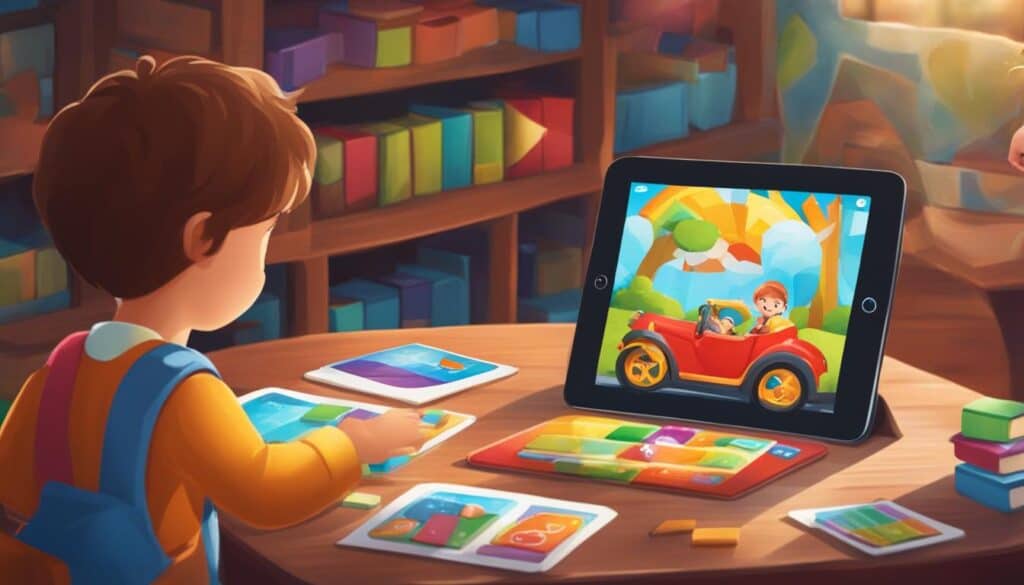In today’s digital age, educational apps have transformed the way children learn and engage with educational content. With a wide range of options available, these apps offer a fun and interactive learning experience for kids. Whether it’s language learning, math games, or science experiments, educational apps utilize the power of technology to make learning enjoyable and effective.
When it comes to finding the best kids learning apps, it’s important to consider the specific educational needs of your child. From preschoolers to teenagers, there are apps that cater to different age groups and subjects. These apps use educational technology to provide personalized learning experiences, allowing children to learn at their own pace and in their own way.
Key Takeaways:
- Educational apps for children offer a fun and interactive learning experience.
- These apps cater to different age groups and subjects.
- They utilize educational technology to provide personalized learning experiences.
- Parents should consider the specific educational needs of their child when choosing educational apps.
- Regular communication with teachers and educators can enhance the learning experience.
The Importance of Educational Apps for Children

Educational apps have revolutionized the way children learn and have become an essential tool for parents and educators. These apps offer a wide range of benefits that enhance the learning experience and make it more effective and engaging.
One of the key advantages of educational apps is their interactive nature. Unlike traditional learning methods, apps provide a hands-on approach that actively involves children in the learning process. Through games, quizzes, and interactive activities, children can actively participate and have fun while learning important concepts and skills.
Furthermore, educational apps offer personalized learning experiences. Each child has their own unique learning style and pace, and apps can adapt to their individual needs. They can provide tailored content and activities, ensuring that children learn at a comfortable and appropriate level. This personalized approach helps children build confidence and achieve better learning outcomes.
Another benefit of educational apps is their accessibility. With the advancements in technology, children can access educational content anytime and anywhere through smartphones and tablets. This flexibility allows for learning beyond the classroom, making education more accessible and convenient, whether at home, during travel, or even during breaks.
“Educational apps provide a fun and effective learning experience for children, promoting interactive learning and personalized education.”
In conclusion, educational apps have transformed the way children learn by offering interactive and personalized experiences. These apps provide a wide range of benefits, including engaging learning methods, personalized content, and accessibility. By utilizing educational apps, parents and educators can enhance children’s learning journey and foster a love for knowledge and discovery.
Top Features to Look for in Educational Apps

Educational apps for children offer a wide range of features that enhance the learning experience. When choosing the right app for your child, it’s important to consider the following key features:
- Interactive Activities: Look for apps that provide interactive activities and games that engage children and make learning enjoyable. These activities should be designed to reinforce key concepts and skills in a fun and interactive way.
- Progress Tracking: Opt for apps that offer progress tracking features, allowing parents and educators to monitor a child’s learning progress. This enables them to identify areas that may need additional attention and provide targeted support.
- Age-appropriate Content: Ensure that the app you choose offers age-appropriate content and activities that are suitable for your child’s developmental stage. This ensures that the app is challenging enough to promote learning without being too overwhelming.
- Ease of Use: Look for apps that are intuitive and user-friendly, with clear instructions and navigation. Children should be able to easily navigate through the app independently, enabling them to focus on the learning content.
- Offline Access: Consider apps that offer offline access, allowing children to continue learning even without an internet connection. This is particularly useful for on-the-go learning or in areas with limited internet access.
By considering these features, you can select educational apps that provide engaging and effective learning experiences for your child.
Why Interactive Activities Matter
Interactive activities are a crucial component of educational apps for children. These activities encourage active participation and engagement, making learning enjoyable and effective. By involving children in hands-on tasks, such as problem-solving puzzles or virtual experiments, educational apps promote critical thinking, creativity, and problem-solving skills.
The Importance of Progress Tracking
Progress tracking features in educational apps enable parents and educators to monitor a child’s learning journey. By tracking progress, they can gain insights into a child’s strengths and weaknesses and customize learning experiences accordingly. This feature also helps celebrate achievements and provides an opportunity for targeted support in areas that may require additional attention.
Language Learning Apps for Children

Learning a new language can open doors to new opportunities and broaden a child’s horizons. Language learning apps for children offer a fun and interactive way for them to learn different languages at their own pace. These apps use a variety of engaging methods, such as games, songs, and stories, to teach vocabulary, pronunciation, and basic grammar.
One popular language learning app is “LingoKids,” which offers a wide range of interactive activities designed to make language learning enjoyable. Children can learn languages such as English, Spanish, French, and German through games, videos, and songs. The app also provides real-time conversations with native speakers to practice speaking skills and offers progress tracking to monitor a child’s language proficiency.
Another language learning app worth mentioning is “Duolingo Kids,” a child-friendly version of the popular language learning app for adults. With colorful and engaging lessons, children can learn languages like Spanish, French, and Portuguese through interactive exercises and challenges. The app adapts to the child’s skill level and provides instant feedback to enhance their learning experience.
Language learning apps for children provide a valuable foundation for future language proficiency and cultural appreciation. Through interactive and immersive experiences, children can develop a love for languages and gain the confidence to communicate in a globalized world.
Math Learning Apps for Children

Math learning apps for children offer a wide range of interactive activities and games that make learning math fun and engaging. These apps are designed to help children develop their math skills while keeping them entertained. Whether it’s addition, subtraction, multiplication, or division, these apps cover various math concepts and provide a comprehensive learning experience.
Math learning apps provide a progression of difficulty levels, allowing children to start with basic concepts and gradually build their math skills. Through interactive math games, children can practice their problem-solving abilities and enhance their critical thinking skills. These apps often incorporate visual and audio elements, making it easier for children to grasp abstract math concepts and apply them in practical situations.
Benefits of Math Learning Apps:
- Interactive math games engage children and make learning enjoyable.
- Progress tracking features allow parents and educators to monitor a child’s math proficiency.
- Visual and audio elements enhance understanding of abstract math concepts.
- Provides a comprehensive learning experience covering various math topics.
Math learning apps play a crucial role in helping children develop a strong foundation in math and build confidence in their abilities. By making math fun and accessible, these apps foster a positive attitude towards learning and empower children to excel in their academic journey.
Science Learning Apps for Children
Science learning apps are an excellent educational tool for children, providing them with interactive experiences to explore and understand various scientific concepts. These apps offer a wide range of activities, experiments, and simulations that make learning science engaging and enjoyable. Whether it’s biology, chemistry, physics, or earth science, there are science learning apps available for children of all ages and interests.
One of the key benefits of science learning apps is their ability to foster curiosity and critical thinking skills. Through interactive experiments and activities, children can explore and learn about the world around them, developing a deeper understanding of scientific principles. These apps encourage children to ask questions, make observations, and draw conclusions, helping them develop essential scientific thinking and problem-solving skills.
Furthermore, science learning apps provide a virtual laboratory experience, allowing children to perform experiments and simulations without the need for physical materials or equipment. This not only makes science learning more accessible but also enables children to conduct experiments that may not be possible in a traditional classroom setting. With the help of these apps, children can develop a hands-on understanding of scientific concepts and build a strong foundation in STEM subjects.
Coding Apps for Children
Learning to code is an essential skill for children in today’s digital age. Coding apps provide a fun and interactive way for kids to learn the basics of programming while honing their problem-solving and critical thinking abilities. These apps use gamification techniques to engage children and make learning to code enjoyable.
Why Coding Apps?
Coding apps offer a structured learning environment where children can progress at their own pace. They provide step-by-step tutorials and challenges that gradually introduce coding concepts and build upon each other. Through interactive projects and coding games, kids can apply what they’ve learned and see their code come to life.
Benefits of Coding Apps
- Enhanced Problem-Solving Skills: Coding apps require children to break down complex problems into smaller, manageable parts. This fosters logical thinking and helps them develop strategies to solve problems efficiently.
- Critical Thinking Development: Coding involves analyzing, evaluating, and making decisions. By engaging with coding apps, children develop critical thinking skills, enabling them to evaluate different approaches and find creative solutions.
- Introduction to Technology: Coding apps expose children to the world of technology and its possibilities. They gain a foundational understanding of how software and hardware work together, setting them up for success in an increasingly digital world.
Popular Coding Apps
- Scratch: Scratch is a visual programming language designed for children. It allows them to create interactive stories, games, and animations by dragging and dropping blocks of code.
- Tynker: Tynker offers a variety of coding courses and projects for kids. It covers topics such as coding fundamentals, game development, and mobile app creation.
- Code.org: Code.org provides a collection of coding activities and tutorials suitable for different age groups. It offers a wide range of coding courses and projects, including partnerships with popular franchises like Minecraft and Star Wars.
By engaging with coding apps, children can develop valuable skills that will benefit them in various aspects of life. From problem-solving to critical thinking, coding apps offer a dynamic learning experience that prepares children for the digital future ahead.
Reading and Literacy Apps for Children
Reading and literacy apps are a valuable tool for helping children develop their reading skills and foster a lifelong love for books. These interactive apps offer a variety of features and activities that cater to different reading levels, making it easier for children to learn to read at their own pace. With engaging stories, phonics lessons, and reading comprehension activities, these apps provide a fun and engaging way for children to improve their literacy skills.
One of the key features of reading and literacy apps is the inclusion of interactive stories. These apps bring stories to life with animations, sound effects, and interactive elements that capture children’s attention and make the reading experience more enjoyable. By interacting with the story, children can enhance their comprehension skills and develop a deeper understanding of the text.
Phonics lessons are another important component of reading and literacy apps. These apps teach children how to recognize and pronounce different sounds and letters, helping them build a strong foundation for reading. With interactive activities and games, children can practice their phonics skills in a fun and engaging way.
Benefits of Reading and Literacy Apps:
- Improved reading skills
- Enhanced comprehension
- Increased vocabulary
- Interactive and engaging learning experience
Overall, reading and literacy apps offer a comprehensive and interactive approach to helping children learn to read. Whether it’s through interactive stories, phonics lessons, or reading comprehension activities, these apps provide the necessary tools and support to help children develop their reading skills and foster a love for books.
Problem-Solving and Critical Thinking Apps for Children
Educational apps for children are not only designed to teach specific subjects but also to develop essential skills such as problem-solving and critical thinking. These apps provide a range of activities and challenges that engage children in logical thinking, decision-making, and analytical reasoning.
Problem-solving apps prompt children to solve puzzles, riddles, and brain teasers, encouraging them to think critically and come up with creative solutions. Through these activities, children learn to analyze information, break down complex problems into manageable parts, and apply logical reasoning to reach a solution.
Critical thinking apps go beyond simple memorization and encourage children to question, evaluate, and form their own opinions. These apps present scenarios and challenges that require children to consider multiple perspectives, make informed decisions, and justify their reasoning. By engaging in these activities, children develop the ability to think independently, assess information critically, and communicate their thoughts effectively.
Benefits of Problem-Solving and Critical Thinking Apps for Children
- Enhance problem-solving skills
- Develop critical thinking abilities
- Promote logical and analytical reasoning
- Foster creativity and innovation
- Encourage independent thinking and decision-making
- Improve communication and explanation skills
By incorporating problem-solving and critical thinking apps into a child’s learning routine, parents and educators can help children develop essential skills that are valuable for academic success and everyday life.
Parental Involvement in Using Educational Apps
When it comes to using educational apps for children, parental involvement plays a crucial role in maximizing its benefits. By actively engaging in their child’s app usage, parents can ensure that the learning experience is both effective and safe. One of the key aspects of parental involvement is monitoring the progress of their child’s learning journey. Regularly checking their performance, understanding their strengths and weaknesses, and identifying areas for improvement can help parents provide targeted support and guidance.
Additionally, setting limitations on screen time is another important aspect of parental involvement. While educational apps are a valuable tool, it’s essential to strike a balance between screen time and other activities. Setting reasonable time restrictions can help children develop healthy digital habits and ensure that they engage in a diverse range of activities for holistic development. It’s important for parents to communicate these limitations clearly and consistently to establish a routine.
Furthermore, open communication between parents and educators is vital in creating a cohesive and supportive learning environment. By actively engaging with teachers, parents can gain insights into the educational goals and objectives of the apps their child is using. This helps parents align their efforts with the curriculum and ensures that they are providing the necessary guidance and reinforcement at home. Regular communication also allows parents to stay updated on their child’s progress and address any concerns or challenges that may arise.
Benefits of Parental Involvement
- Improves monitoring of a child’s progress in educational apps.
- Enables parents to set limitations on screen time for a balanced lifestyle.
- Facilitates open communication with teachers and educators.
“Parental involvement in using educational apps can significantly enhance a child’s learning experience and overall educational development.”
In summary, while educational apps offer a wealth of opportunities for children to learn and grow, parental involvement is key to maximizing their benefits. By monitoring progress, setting limitations on screen time, and maintaining open communication with educators, parents can create a supportive learning environment that complements their child’s educational journey.
The Future Trends in Educational Apps for Children
The world of educational apps for children is constantly evolving, driven by emerging technologies and a growing emphasis on personalized learning. These advancements are shaping the future of educational apps, making them even more immersive, interactive, and tailored to each child’s unique needs.
One of the most exciting trends in educational apps is the integration of augmented reality (AR) and virtual reality (VR) technologies. AR and VR enhance the learning experience by overlaying digital elements onto the real world or creating entirely virtual environments. Children can explore historical landmarks, dive into the depths of the ocean, or even travel back in time through these immersive experiences. The combination of real-world interaction and digital content helps children grasp complex concepts in a more engaging and memorable way.
Another emerging trend in educational apps is the use of artificial intelligence (AI) to personalize the learning journey. AI technology can analyze a child’s strengths, weaknesses, and learning style to deliver customized content and recommendations. This personalization ensures that children are challenged at their appropriate skill level, allowing for more effective and efficient learning. AI-powered educational apps can adapt in real-time, providing tailored feedback and support to help children overcome obstacles and achieve their learning goals.
The future of educational apps for children holds immense potential for unlocking the curiosity and imagination of young learners. Here are some key trends to watch out for:
- Interactive gamification: Educational apps are incorporating game-like elements, such as rewards, badges, and leaderboards, to motivate and engage children in their learning journey. Gamification enhances the sense of achievement and creates a fun and competitive learning environment.
- Collaborative learning: With the advancement of technology, educational apps are enabling children to connect and collaborate with their peers from around the world. Through virtual classrooms, children can work together on projects, exchange ideas, and develop important social and communication skills.
- Data-driven insights: Educational apps are increasingly using data analytics to provide insights into a child’s learning progress and performance. These insights can help educators and parents identify areas of improvement, track milestones, and make informed decisions about a child’s educational journey.
The future of educational apps for children is bright, with emerging technologies and personalized learning approaches paving the way for more engaging and effective learning experiences. By harnessing the power of augmented reality, virtual reality, artificial intelligence, and other innovative features, educational apps will continue to revolutionize the way children learn and grow.
Conclusion
Educational apps for children have revolutionized the way kids learn and engage with educational content. With a wide range of subjects and interactive features, these apps provide a fun and effective learning experience anytime, anywhere. Whether it’s language learning, math games, science experiments, or coding projects, educational apps offer a wealth of opportunities for children to explore, learn, and grow. Embracing the power of educational apps can help children develop essential skills and create a lifelong love for learning.
 Fullersears
Fullersears





